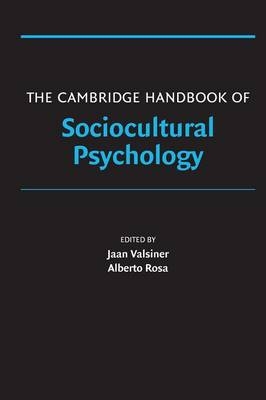
The Cambridge Handbook of Sociocultural Psychology
Cambridge University Press (Verlag)
978-0-521-85410-8 (ISBN)
- Titel erscheint in neuer Auflage
- Artikel merken
This book, first published in 2007, is an international overview of the state of our knowledge in sociocultural psychology - as a discipline located at the crossroads between the natural and social sciences and the humanities. Since the 1980s, the field of psychology has encountered the growth of a new discipline - cultural psychology - that has built new connections between psychology, sociology, anthropology, history and semiotics. The handbook integrates contributions of sociocultural specialists from fifteen countries, all tied together by the unifying focus on the role of sign systems in human relations with the environment. It emphasizes theoretical and methodological discussions on the cultural nature of human psychological phenomena, moving on to show how meaning is a natural feature of action and how it eventually produces conventional symbols for communication. Such symbols shape individual experiences and create the conditions for consciousness and the self to emerge; turn social norms into ethics; and set history into motion.
Jaan Valsiner is a cultural psychologist with a consistently developmental axiomatic base that is brought to analyses of any psychological or social phenomena. He is the founding editor (1995) of the Sage journal Culture & Psychology. He is currently professor of psychology in the Department of Psychology at Clark University. He has published many books, the most recent of which are The Guided Mind (1998); Culture and Human Development (2000); and Comparative Study of Human Cultural Development (2001). He edited (with Kevin Connolly) the Handbook of Developmental Psychology (2003). He established the new journal on individual case analyses, International Journal of Idiographic Science (2005), and is the editor of Integrative Psychological and Behavioral Sciences and From Past to Future: Annals of Innovations in Psychology (2007). In 1995, he was awarded the Alexander von Humboldt Prize in Germany for his interdisciplinary work on human development. He has been a visiting professor in Japan, Australia, Estonia, Germany, Italy, the United Kingdom, and the Netherlands. Alberto Rosa is professor of psychology at the Universidad Autonoma de Madrid. He is a member of the Sociedad Espanola de Historia de la Psicologia and the International Society for Cultural and Activity Research, and he has served as vice president for the latter since 2005. In 1987, the Spanish Ministry of Labour and Social Affairs awarded him the Second National Award for research and technical aids to the handicapped. He has taught courses in Argentina, Brazil, Chile, Colombia, Italy, Mexico, and Sweden.
Editors' introduction. Contemporary social-cultural research: uniting culture, society, and psychology; Part I. Theoretical and Methodological Issues: 1. The myth and beyond: ontology of psyche and epistemology of psychology; 2. Language, cognition, subjectivity - a dynamic constitution; 3. Psychology within time: theorizing about the making of sociocultural psychology; 4. Sampling reconsidered: idiographic science and analysis of personal life trajectories; Part II. From Nature to Culture: 5. The windowless room: 'mediationism' and how to get over it; 6. Functional systems of perception-action and re-mediation; 7. Comparative development of communication: an evolutionary perspective; 8. The material practices of ape language research; 9. The end of myths and legends about biological and cultural evolution: a new view in the knowledge on hominid paleo-ethoecology; Part III. From Orientation to Meaning: 10. Acts of psyche: actuations as synthesis of semiosis and action; 11. Time and movement in symbol formation; 12. Object use, communication and signs: the triadic basis of early cognitive development; 13. Network of meanings: a theoretical-methodological perspective for the investigation of human developmental processes; Part IV. Symbolic Resources for the Constitution of Experience: 14. Dramaturgical actuations and symbolic communication, or how beliefs make up reality; 15. Analysis of cultural emotion: understanding of indigenous psychology for universal implications; 16. The role of symbolic resources in human lives; 17. Perpetual uncertainty of cultural life: becoming reality; 18. Prayer and the kingdom of heavens: psychological tools for directivity; 19. 'Myself, the project': sociocultural interpretations of young adulthood; Part V. From Society to the Person through Culture: 20. Apprenticeship in conversation and culture: emerging sociability in preschool peer talk; 21. The creation of new cultures in peer interaction; 22. 'Culture has no internal territory': culture as dialogue; 23. Cultural-historical approaches to designing for development; 24. Money as a cultural tool mediating personal relationships: child development of exchange and possession; 25. The family: negotiating cultural values; Part VI. From Social Culture to Personal Culture: 26. Culture and social representations; 27. The institutions inside: self, morality and culture; 28. Identity, rights and duties: the illustrative case of positioning by Iran, the United States and the European Union; 29. Symbolic politics and cultural symbols: identity formation between and beyond nations and states; 30. The dialogical self: social, personal, and (un)conscious; Part VII. Making Sense of the Past for the Future: Memory and Self-Reflection: 31. Social and cognitive determinants of collective memory for public events; 32. Collective memory; 33. Issues in the sociocultural study of memory: making memory matter; 34. The social basis of self-reflection; General conclusions.
| Erscheint lt. Verlag | 4.6.2007 |
|---|---|
| Reihe/Serie | Cambridge Handbooks in Psychology |
| Verlagsort | Cambridge |
| Sprache | englisch |
| Maße | 184 x 260 mm |
| Gewicht | 1404 g |
| Themenwelt | Geisteswissenschaften ► Psychologie ► Allgemeine Psychologie |
| Geisteswissenschaften ► Psychologie ► Sozialpsychologie | |
| ISBN-10 | 0-521-85410-5 / 0521854105 |
| ISBN-13 | 978-0-521-85410-8 / 9780521854108 |
| Zustand | Neuware |
| Haben Sie eine Frage zum Produkt? |
aus dem Bereich



